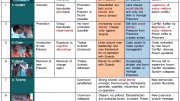
Forensic psychologists apply the principles of psychology to the criminal justice and legal fields. They typically aid attorneys, judges and others in the legal field in their understanding of the psychological findings associated with a specific case.
As a student in this field, you will take courses in general psychology, forensic science and criminal justice. Associate degree programs in forensic psychology are extremely uncommon and graduates of these programs will be unable to pursue work as a forensic psychologist without an advanced degree. If you are interested in forensic psychology, you can learn more about this field through associate degree programs in psychology and forensic science. Bachelor's programs in forensic psychology prepare you for graduate study and potential careers in criminal justice.
Although employment growth for psychologists was expected to increase according to the U.S. Bureau of Labor Statistics (BLS), growth is highly dependent on specialties within psychology. With the exception of school, counseling, clinical and industrial-organizational psychologists, employment was expected to increase by 18% for all other specialties.
| Associate | Bachelor's | |
|---|---|---|
| Who is this degree for? | Individuals interested in criminal justice and psychology and those who wish to continue further study in bachelor's programs | Students interested in pursuing graduate studies or entry-level careers in criminal justice |
| Common Career Paths (with approximate annual salary) |
- Mental health worker ($21, 000-$40, 000)**
- Forensic science technician ($25, 000-$78, 000)** - Criminalist ($21, 000-$68, 000)** - Youth counselor ($20, 000-$37, 000)** |
- Police officer ($56, 000)*
- Probation officer ($52, 000)* - Mental health case manager ($25, 000-$45, 000)** Crime analyst ($27, 000-$66, 000)** |
| Time to Completion | 2 years full-time | 4 years full-time |
| Common Graduation Requirements | None | Internship |
| Prerequisites | High school diploma or GED | |
| Online Availability | Yes | None found at this time |
Source: learningpath.org
You might also like:















